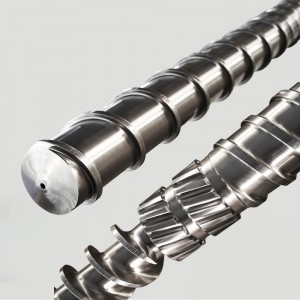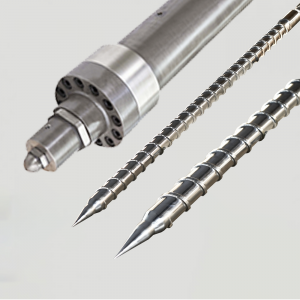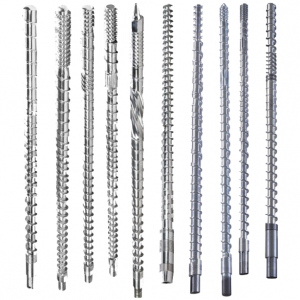
Single screw barrels play a vital role in modern recycling granulation processes. Their ability to enhance material quality while reducing waste makes them indispensable for industries. Tools like the Pvc Single Screw Extruder and Plastic Profile Extrusion Machine demonstrate how these components adapt to diverse applications. Unlike the Parallel Twin Screw Extruder, single screw barrels prioritize simplicity and energy efficiency. The Single screw barrel for recycling granulation contributes significantly to sustainability by supporting circular economy initiatives.
What is a Single Screw Barrel for Recycling Granulation?

Definition and Functionality
A single screw barrel for recycling granulation is a critical component in the plastic recycling process. It is designed to melt, mix, and reshape plastic materials into granules that can be reused in manufacturing. This tool operates by rotating a screw within a cylindrical barrel, applying heat and pressure to transform raw or recycled plastic into a uniform, high-quality output. Its straightforward design ensures efficient material flow and consistent performance, making it a preferred choice for many industries.
The primary functionality of a single screw barrel lies in its ability to handle diverse plastic types, including Polyethylene (PE), Polypropylene (PP), Polystyrene (PS), and Polyvinyl Chloride (PVC). By maintaining precise temperature control and pressure parameters, it ensures optimal plasticization and granulation. This versatility allows manufacturers to meet the demands of various applications, from packaging to construction materials.
Key performance metrics define the operational effectiveness of a single screw barrel. These include:
- Material Composition: Determines resistance to wear and corrosion.
- Size: Impacts production capacity and efficiency.
- Pressure Parameters: Dictates the maximum pressure the barrel can withstand.
These factors collectively enhance the reliability and efficiency of the recycling process, ensuring high-quality output with minimal waste.
Key Design Features and Materials
The design and materials of a single screw barrel significantly influence its durability and performance. The JT Single Screw Barrel for Recycling Granulation exemplifies advanced engineering with its robust specifications. The following table highlights its technical details:
| Specification | Details |
|---|---|
| Diameter (φ) | 60-300 mm |
| Length-to-Diameter (L/D) | 25-55 |
| Material | 38CrMoAl |
| Nitriding Hardness | HV≥900 |
| Wear Off After Nitriding | 0.20 mm |
| Hardness After Nitriding | ≥760 (38CrMoALA) |
| Nitride Brittleness | ≤ secondary |
| Surface Roughness | Ra0.4µm |
| Straightness | 0.015 mm |
| Alloy Layer Thickness | 1.5-2 mm |
| Alloy Hardness | Nickel base HRC53-57; Nickel base + Tungsten carbide HRC60-65 |
| Chromium Plating Thickness | 0.03-0.05 mm |
The use of high-quality materials, such as 38CrMoAl, ensures exceptional resistance to wear and corrosion. The nitriding process enhances surface hardness, while the alloy layer provides additional strength under high-stress conditions. These features make the single screw barrel a reliable and long-lasting solution for recycling granulation.
In addition to its material composition, the structural design of the single screw barrel contributes to its efficiency. Its simple yet effective structure supports excellent mixing and plasticizing capabilities, making it suitable for a wide range of applications. The adaptability of this design ensures compatibility with various plastic types, further enhancing its value in recycling operations.
Benefits of Single Screw Barrel for Recycling Granulation
Energy Efficiency and Cost Savings
The single screw barrel for recycling granulation offers significant energy efficiency, making it a cost-effective solution for manufacturers. Its streamlined design minimizes energy consumption by optimizing the heat and pressure applied during the plastic granulation process. This efficiency reduces operational costs, allowing businesses to allocate resources more effectively.
Additionally, the precise engineering of the screw and barrel ensures minimal energy loss. For example, the JT Single Screw Barrel achieves high thermal conductivity, which accelerates the melting process and shortens production cycles. This feature not only saves energy but also increases throughput, enabling manufacturers to meet higher production demands without additional costs.
Tip: Investing in energy-efficient equipment like the single screw barrel can lead to long-term savings and a reduced carbon footprint, aligning with sustainability goals.
Consistent Output and Material Quality
Consistency in output is a critical factor in recycling granulation, and the single screw barrel excels in this area. Its advanced design ensures uniform melting and mixing of plastic materials, resulting in high-quality granules with consistent properties. This reliability is essential for industries that require precise material specifications, such as packaging and construction.
The JT Single Screw Barrel, for instance, maintains strict control over temperature and pressure parameters. This precision eliminates common issues like uneven plasticization or material degradation. As a result, manufacturers can produce granules that meet stringent quality standards, reducing the likelihood of defects in the final product.
Moreover, the durability of the barrel contributes to consistent performance over time. Its wear-resistant materials, such as 38CrMoAl and tungsten carbide layers, ensure long-lasting operation with minimal maintenance. This reliability translates to fewer production interruptions and higher overall efficiency.
Versatility Across Plastic Types
The versatility of the single screw barrel for recycling granulation makes it an invaluable tool for processing a wide range of plastic materials. It can handle various types of plastics, including Polyethylene (PE), Polypropylene (PP), Polystyrene (PS), and Polyvinyl Chloride (PVC). Each of these materials has unique properties and applications, and the single screw barrel adapts seamlessly to their specific requirements.
For example, PE is commonly used for products like plastic bags and bottles due to its toughness and corrosion resistance. The single screw barrel processes this material efficiently, ensuring optimal granulation. Similarly, it handles PP, known for its high-temperature stability, and PVC, which can be tailored into soft or rigid forms for diverse applications.
The adaptability of the JT Single Screw Barrel extends to other plastics like PET and PS, making it a versatile choice for manufacturers. Its customizable design allows it to meet the specific needs of different recycling operations, enhancing its value across industries.
Note: The ability to process multiple plastic types with a single piece of equipment reduces the need for additional machinery, saving both space and investment costs.
How Single Screw Barrels Improve Recycling Processes

Enhancing Material Quality and Reducing Waste
Single screw barrels play a pivotal role in improving material quality during recycling granulation. Their precise engineering ensures uniform melting and mixing of plastic materials, which eliminates inconsistencies in the final granules. This uniformity is essential for industries that demand high-quality recycled plastics for applications such as packaging and construction.
Operational metrics further highlight their efficiency. Wear on screws and barrels directly impacts melting performance. Increased wear leads to larger clearances, reducing melting efficiency. Operators often adjust screw speed, barrel temperatures, and backpressure to maintain productivity. These adjustments demonstrate how single screw barrels contribute to reducing waste by optimizing the recycling process. Proper barrel temperature settings also prevent defects like flow surging and poor melting, ensuring consistent material quality and minimizing waste generation.
Supporting Sustainability and Circular Economy Goals
Single screw barrels for recycling granulation align with sustainability objectives by enabling the efficient reuse of plastic materials. Their ability to process diverse plastics, including Polyethylene (PE), Polypropylene (PP), and Polyvinyl Chloride (PVC), supports the circular economy by reducing reliance on virgin materials.
By enhancing the granulation process, these barrels help manufacturers produce high-quality recycled plastics that meet industry standards. This capability reduces the environmental impact of plastic production and promotes resource conservation. Their energy-efficient design further contributes to sustainability by lowering operational energy consumption, which aligns with global efforts to reduce carbon footprints.
Tip: Incorporating single screw barrels into recycling operations can help businesses achieve sustainability goals while maintaining profitability.
Ensuring Long-Term Reliability and Performance
Durability and reliability are key attributes of single screw barrels. High-quality materials, such as 38CrMoAl and tungsten carbide layers, ensure resistance to wear and corrosion. These features extend the operational lifespan of the barrels, reducing maintenance requirements and downtime.
Precision in design also enhances long-term performance. For instance, the JT Single Screw Barrel maintains strict tolerances for straightness and surface roughness, ensuring consistent operation over time. Proper barrel temperature settings further optimize solids conveying, melting, and discharge temperature, preventing defects that could compromise reliability.
Manufacturers benefit from this reliability by achieving uninterrupted production cycles and consistent output quality. The robust construction of single screw barrels makes them a dependable choice for recycling granulation processes, ensuring long-term efficiency and cost-effectiveness.
Single screw barrels remain pivotal in modern recycling granulation. Their robust design ensures durability, while their adaptability supports diverse industrial applications.
Key Insight: As industries prioritize sustainability, these tools will play an even greater role in advancing circular economy initiatives. Their efficiency and reliability make them indispensable for achieving long-term environmental goals.
FAQ
What types of plastics can a single screw barrel process?
A single screw barrel processes plastics like Polyethylene (PE), Polypropylene (PP), Polystyrene (PS), and Polyvinyl Chloride (PVC), ensuring versatility across diverse recycling applications.
How does the JT Single Screw Barrel ensure durability?
The JT Single Screw Barrel uses 38CrMoAl material, nitriding hardness of HV≥900, and tungsten carbide layers, providing exceptional wear resistance and long-lasting performance.
Why is energy efficiency important in recycling granulation?
Energy efficiency reduces operational costs, minimizes environmental impact, and supports sustainability goals, making it a critical factor in modern recycling processes.
Tip: Choosing energy-efficient equipment like the JT Single Screw Barrel can enhance productivity while aligning with eco-friendly practices.
Post time: May-13-2025
